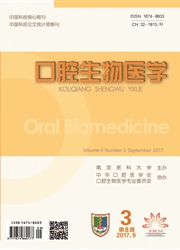

 中文摘要:
中文摘要:
目的:研究小鼠舌肌发育的分子调控机制。方法:取胚胎第13.25天(E13.25)及 E15.5小鼠舌组织。应用 Affy-metrix Mouse GeneChip,对胎鼠舌发育过程中的差异基因进行筛选。应用 DAVID 网络分析工具对基因进行功能和聚类分析。结果:基因功能和聚类分析表明,在 E13.25高表达的基因主要与细胞周期相关因子(Exo1、Gsk3B、Kif20b、Skp2)和细胞粘附因子(Neo1、lama1)等相关。在 E15.5高表达的基因主要与细胞骨架(titin、Hspb7)相关。结论:小鼠舌组织增殖和特化与细胞周期和细胞粘附基因相关,舌组织分化和成熟主要与细胞骨架相关。
 英文摘要:
英文摘要:
Objective:To gain insight into the molecular mechanisms associated with mouse tongue myogenesis.Methods:Different genes in the tongue at mouse embryonic day 13.25 (E13.25)and 15.5 was investigated using Affymetrix Mouse GeneChip.Using the twice significance of difference as the standard,the molecular mechanisms of tongue development were studied and several molecules re-lated were identified by DAVID functional annotation clustering analysis.Results:Genes of higher expression level at E13.25 were re-lated to cell cycle and cell adhesion,of whom Exo1 ,Gsk3B,Kif20b,Skp2 (cell cycle related factors)and Neo1 and lama1 (cell adhe-sion factors)were activated.While genes of higher expression level at E15.5 were related to cytoskeleton,such as titin and Hspb7. Conclusions:The proliferation and determination of tongue were related with gene clusters of cell cycle and cell adhesion,and,differen-tiation and maturation of tongue were relevant to gene cluster of cytoskeleton.It had highlighted potential cascades and important candi-dates for further investigation on the genetic mechanism and clinical therapy of tongue related diseases.
 同期刊论文项目
同期刊论文项目
 同项目期刊论文
同项目期刊论文
 Implications of the Wnt5a/CaMKII Pathway inRetinoic Acid-Induced Myogenic Tongue Abnormalities of De
Implications of the Wnt5a/CaMKII Pathway inRetinoic Acid-Induced Myogenic Tongue Abnormalities of De Morphological characteristics of self-etchadhesives bonding to non-carious cervical sclerotic dentin
Morphological characteristics of self-etchadhesives bonding to non-carious cervical sclerotic dentin 期刊信息
期刊信息
